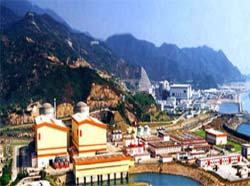
After careful scrutiny and discussion, a panel of 14 renowned Chinese physicists said yes to a proposal for a 240-million-yuan project of neutrino experiment at the Daya Bay Reactor in the east of Shenzhen, Guangdong Province.
The project, which is to be hosted by the CAS Institute of High Energy Physics in cooperation with US colleagues, will afford an important historical opportunity for the development of particle physics, stresses the panel, which convened under the auspices of the Ministry of Science and Technology on August 15 and 16 in Shenzhen, south China's Guangdong Province.
The Neutrino, being considered as one of the fundamental particles, has a very important role in both of the microscopic view of particle physics and the macroscopic view of evolution of the Universe. Breakthroughs have been made in recent years, including the discovery of non-zero neutrinos masses, 'neutrino oscillation' phenomenon or neutrinos mixing. Experts say that neutrino physics has been a hot research topic of high energy physics, astrophysics and cosmology.
The Daya Bay Neutrino Experiment is a neutrino-oscillation experiment to measure the smallest lepton flavor mixing angle θ13 using electron anti-neutrinos produced by the reactors of the Daya Bay Nuclear Power Plant (NPP) and the Ling Ao NPP. As the Daya Bay is the best site for conducting such experiments among similar locations in other parts of the world, the experiment is expected to provide a great opportunity for exciting discoveries.
The project has recently received 50 million yuan (about $6.25 million) support from CAS. Funds from other Chinese funding agencies, such as Ministry of Science and Technology and China National Natural Science Foundation, are expected within months.





